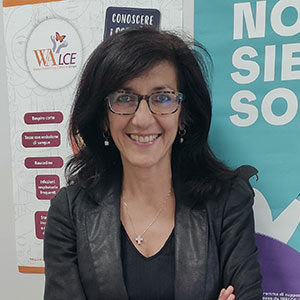From the website of our colleagues at Lung Cancer Policy Network:
We speak to Stefania Vallone, Board member, Women Against Lung Cancer in Europe (WALCE), Italy

What led you to work in the field of lung cancer?
My experience as a patient advocate began by chance in 2007, when I met an oncologist who gave me the opportunity to become more familiar with the thoracic oncology field. I was also motivated to become more engaged in this area by the many challenges within lung cancer at that time. There was no screening, and few survivors or treatments, as well as very low public support and media coverage, with increased stigma!
My first interest was in primary prevention, because smoking addiction is still a big issue in Italy, especially among young people. Over the years I have worked with other advocates in Italy and abroad, to generate more awareness about lung cancer and help people take a more active role in their own care. I have also spent time implementing services and programmes to help people with lung cancer address their needs. It has been fascinating to observe the first research results and witness the evolution that has taken place in lung cancer. This progress is what gives motivates me to continue working as a patient advocate.
What does an average work-day look like for you?
My working days always start with a good Italian coffee and a chat with my colleague.
My role is helping people who come to WALCE for support, and raising awareness for lung cancer. When I work in the office, I get calls or messages from people who need a transport service, to contact a nutritionist or other specialists, or information on WALCE patient activities. Sometimes people come to the office in person – not necessarily to ask for anything, but just to say hello and thank you. At least twice a week I attend virtual meetings to discuss new projects, as well as educational webinars.
In recent years my working days have become more intense, with WALCE multiplying the number of initiatives for people with lung cancer and the population. We now reach many parts of Italy and engage an ever-increasing number of people. We have also increased our presence on advisory boards and committees in Italy and abroad. I partake in many advocacy meetings as well as tables on national health policies, making sure patient’s voices are heard.
In the last two years, I have been part of the effort to implement a screening programme in Italy. We now have a national pilot for the implementation of LDCT screening in 19 centres across Italy. I also contribute to many events promoting the precision medicine throughout Italy.


